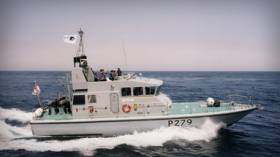Displaying items by tag: Gibraltar
Small Yet Fast Royal Navy Patrol Craft to Pay Visit
#FastPatrols -A pair of small yet high-speed Royal Navy Inshore Patrol Craft in which one served in Gibraltar are to pay a visit to Dublin Port,writes Jehan Ashmore.
The ‘Archer’ class HMS Blazer along with HMS Ranger are to arrive today. They belong to the 14 strong P2000 Fast Inshore Patrol Craft that form the First Patrol Boat Squadron.
Primary role of the P2000’s is to support the University Royal Naval Units (URNU) but they also contribute to a wide range of Fleet tasking. Among them fishery protection duties and safeguarding the integrity of the UK's territorial waters.
The craft provide training and maritime experience for University Royal Naval Unit students and also provide support to Fleet tasking and exercises.
HMS Blazer (P279) is the URNU at Southampton Solent University, Portsmouth University and Southampton Institute.
As for HMS Ranger, this sister is the URNU at Sussex University, however she served for 13 years in the Gibraltar Squadron before returning to the UK in 2004.
Some characteristics of the Archer P2000 craft are listed below.
Tonne Displacement: 54
Top Speed: 25 knots
Nautical Range: (550 miles)
Weapons: DS3OB 30mm Gun and GAM BO 20mm Gun
The visiting Royal Navy pair are to berth at Ocean Pier from where HMS Portland also called in recent years. The Type 23 Duke class frigate was referred to related naval news regards the recently decommissioned RFA Gold Rover.
Dutch Teen Breaks Record for Youngest Solo Round-The World Voyage
#WORLD RECORD - A Dutch teenager has become the youngest sailor to circumnavigate the world solo - following a court battle for the right to embark on the challenge.
Sixteen-year-old Laura Dekker sailed into harbour at Sint Maarten in the Caribbean on Saturday afternoon to complete her round-the-world voyage.
She arrived a year and two days after setting out, and beat the previous unofficial record held by Australian Jessica Watson by eight months, according to RTÉ News.
The feat is more remarkable in that Dekker sailed from port-to-port, staying at sea for at most three weeks at a time, whereas Watson voyaged non-stop.
But the adventure almost didn't happen, as Dekker and her father had to fight in a court in Utrecht for the right to attempt the record, as previously reported on Afloat.ie.
Dekker has originally planned to set out a year earlier, at the age of 14, but the court ordered her placed in the care of welfare officers on the grounds that she was too young to guarantee her safety at sea.
She finally won the court battle in July 2010 and set sail from Gibraltar the following month, though a change to her planned course saw the challenge officially begin in Sint Maarten in January 2011 instead.
However, the record will not be officially recognised by the Guinness Book of World Records nor the World Sailing Speed Record Council, which does not classify records by age.
RTÉ News has more on the story HERE.






























































